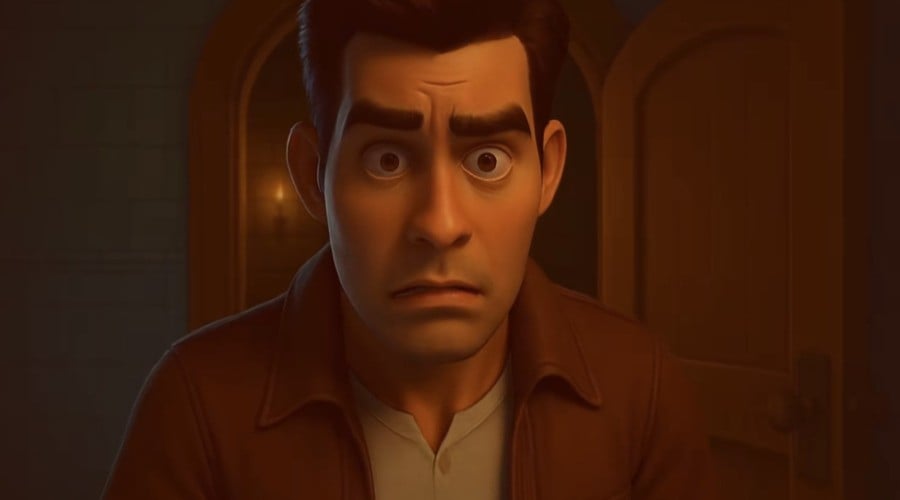
A short while ago, we reported on the news that Dizzy creators the Oliver Twins – two of the most famous game designers to emerge from the '80s bedroom coding boom in Great Britain – were embracing Generative AI to create interactive experiences through their RichCast platform.
The pair have actually been working on this tech for a while now, but it was only when they announced a remake of one of their 1980s classics – Ghost Hunters – that the gaming community sat up and took notice.
Ghost Hunters has just launched on RichCast, and I can report that it's utterly abysmal. In fact, it's one of the worst games I've played in quite some time – and I use the word 'game' in the loosest possible sense, as this barely qualifies as one.
Those of you who are long-time readers of the site will be well aware that we're not fans of GenAI here at Time Extension. The technology is built on theft, with image and video creation tools being trained on vast quantities of data, almost always without the permission of the artists behind it.
Furthermore, GenAI is then used to effectively replace those artists by offering a cheaper means of creating images, video and music. Despite looking visually convincing at a casual glance, Ghost Hunters is a perfect example of that; it was 'made' by a core team of just five people (the credits screen proudly states that Generative AI was used in its development).
Ghost Hunters involves two hapless brothers entering a haunted mansion, and for most of its mercifully short runtime, you'll be watching streamed video of GenAI-created conversations between them. Amusingly, their faces actually change from scene to scene, and, at one point, one of the siblings' voices switches from an English to an American accent (the voices, it should be noted, are lifeless and lack depth – they're GenAI too, of course). This is a shortcoming of the GenAI approach, which essentially generates footage based on either static images or prompts and struggles to maintain consistency between scenes.
The 'face' issue is worth dwelling on, because it completely undermines what little sense of immersion Ghost Hunters has; facial features not only drastically alter between scenes, but eyeballs contort and melt, making the whole thing look depressingly shoddy. Had The Oliver Twins hired a proper 3D artist rather than relying on GenAI, they could have animated these characters properly and avoided such issues.
Because it's effectively an FMV game made up of GenAI-generated video footage, interactivity in Ghost Hunters is limited to firing your weapon (which also changes shape and design as the adventure rolls on) at on-screen targets during pre-determined battle scenes. There are boss encounters, but they present zero challenge; you have to shoot a weak spot when it appears.
Despite the mind-numbing simplicity of these sections, they're hilariously buggy – during two of the shootouts, the game refused to move onto the next scene despite my having reduced the enemy's energy counter to zero; the fact that you can manually skip to the next scene was the only way I could proceed.
Ghost Hunters can be finished in a matter of minutes, and, beyond poking fun at how bad it all looks, there's absolutely no incentive to return. In fact, many people might not even make it to the end despite its brevity; the gameplay is so painfully basic and the presentation so laughably poor that I suspect a great many players won't find the willpower to get past the first room.
Now, the Oliver Twins may well defend such a project on two counts. Firstly, it's entirely free to play Ghost Hunters, so there's no revenue to be generated here – they could argue it's just a fun way to revive an old concept, rather than a serious attempt to make a proper video game. The sticking point there is that RichCast remains a commercial venture, and the brothers will no doubt use experiences like Ghost Hunters to secure future business.
Additionally, they could draw a comparison to the advent of CD-ROM gaming in the early '90s, where visuals suddenly took a massive leap forward thanks to the increased storage capacity, allowing for lavish CG rendering and FMV. However, gameplay took a significant step backwards as games were reduced to little more than mildly interactive slideshows; it was only when hardware caught up with the potential of CD-ROM storage that the medium really lived up to its promise.
Could GenAI gaming be similarly limited by the fact that the tech is still in its infancy? Quite possibly. As AI advocates are fond of saying, "this is as bad as it will ever be", but even if this leads to more playable and better-looking experiences, the ethical issue of how GenAI is trained is unlikely to go away.
The industry is at a crossroads today; companies like EA and Ubisoft are embracing GenAI as a means of accelerating the creation of video games, and we're already seeing firms in other sectors lay off staff to replace them with AI-based systems.
Outside of that problem, the aforementioned issue of how these systems are trained refuses to go away. Simply put, companies like OpenAI, Google and Meta have all abused the concept of 'fair use' to create GenAI tools which not only scrape data without permission or compensation but also threaten to replace human artists in the long run.
The fact that Ghost Hunters is a terrible game might not be enough to change the way the industry is going, but it certainly doesn't present a valid argument for adopting GenAI in video game production right now – and it's a shame that The Oliver Twins have besmirched their legacy by releasing such a lazy, half-baked product masquerading as a video game.
